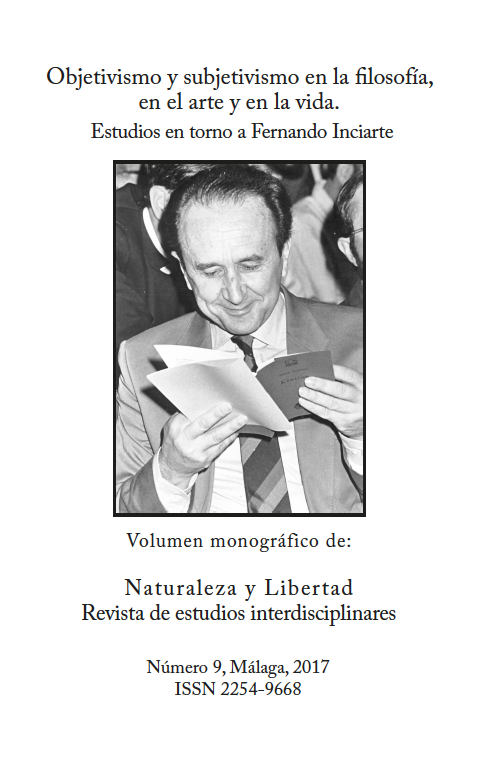Libertad humana y libertad divina. Una lectura de 'Cultura y verdad' a la luz de 'La imaginación trascendental'
DOI:
https://doi.org/10.24310/NATyLIB.2017.v0i9.6377Keywords:
Inciarte, libertad, fe, autonomía, heteronomía, reconciliación,Abstract
Esta contribución ofrece un análisis del tratamiento de la experiencia de conflicto entre las pretensiones de realización de la libertad humana, de un lado, y el reconocimiento de la libertad divina y su poder respecto de la propia vida, de otro, así como de la naturaleza de su resolución tal y como los presenta Fernando Inciarte en dos de sus obras: Cultura y Verdad y La imaginación trascendental en la vida, en el arte y en la filosofía. La tesis principal es que la reconciliación entre ambas libertades es imposible en términos humanos y que, sin embargo, cierta forma de vivir orientada por el reconocimiento de esta misma imposibilidad abre al hombre a su resoluciónDownloads
Metrics
References
F. Inciarte, Cultura y Verdad, Pamplona, Eunsa, 2016.
F. Inciarte, La imaginación trascendental en la vida, en el arte y en la filosofía, Pamplona, Eunsa, 2012.
Downloads
Published
How to Cite
Issue
Section
License
Those authors who have publications with this journal, accept the following terms:
1. Copyright and licensing information are clearly described on the journal’s web site: all content published in Naturaleza y Libertad is open acces without limit, and are subject to the Attribution-NonCommercial-ShareAlike 4.0 International (CC BY-NC-SA 4.0) license. The full text of which can be consulted at https://creativecommons.org/licenses/by-nc-sa/4.0/
2. It is the responsibility of the authors to obtain the necessary permissions for the images that are subject to copyright. The authors whose contributions are accepted for publication in this journal will retain the non-exclusive right to use their contributions for academic, research and educational purposes, including self-archiving or deposit in open access repositories of any kind. The electronic edition of this magazine is edited by the Editorial de la University of Malaga (UmaEditorial), being necessary to cite the origin in any partial or total reproduction.
3. This journal allows and encourages authors to publish papers on their personal websites or in institutional repositories, both before and after their publication in this journal, as long as they provide bibliographic information that accredits, if applicable, your posting on it.
4. In no case will anonymous papers be published.





18.png)













